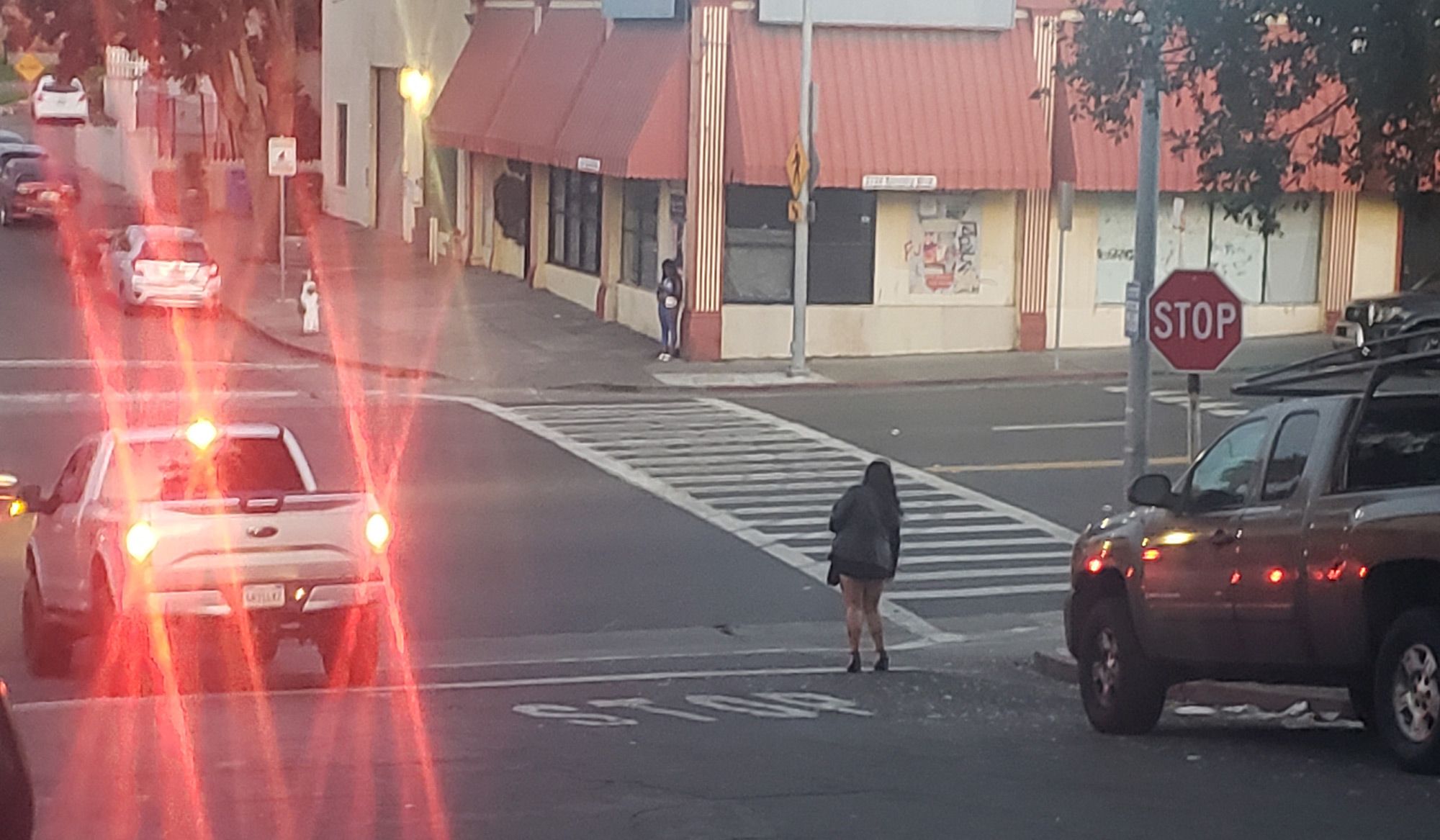VALLEJO – Neighbors along a section of Vallejo’s Sonoma Boulevard are proposing a plan to install traffic barriers blocking drivers from turning on or off of the road to deter sex work in the area.
In the past year, the St. Vincent’s Hill neighborhood association has been meeting with law enforcement and city officials to address a number of concerns related to a section of Sonoma Boulevard that has long been used by sex workers to attract clients.
Many neighbors have similar complaints about drivers circling the block, looking to pick up sex workers. Neighbors said that the drivers speed, swing into the opposing traffic lane, and don’t look when they are turning because they are paying attention to the women on the corner.
Neighborhood organizers said that initially the city did not pay much attention to their complaints until they sent photos of a city utility truck that had pulled over to speak to one of the women.
Councilmember Charles Palmares, who represents the district, put forward a plan to install barriers on the east and west sides of Sonoma Boulevard between Tennessee and Florida streets. The proposal would place plastic bollards, either blocking off only the right lane so drivers could not turn off of Sonoma but could still enter onto Sonoma from the side streets, or block both lanes with the plastic bollards.
A third option would install a combination of planters or concrete barriers leaving an opening that would allow emergency vehicles with high clearance to pass while obstructing other vehicles.
CalTrans spokesperson Bart Ney said that at first glance the project does not appear to interfere with the operation of Highway 29, which is the agency’s main concern. The next step, he said, is for CalTrans engineers to meet with the city’s public works department to see what options can work.
A similar traffic barrier project was initiated in San Francisco at another long established location where sex workers advertise their services.
But Celestina Pearl, a nurse and a former sex worker, said that the barriers have led to dangerous situations for sex workers.
Pearl runs an outreach program in San Francisco called the Naughty Nurse Mobile that distributes occupational safety and hygiene supplies, runs a “bad date” list for sex workers to report abuse from clients or police officers, and otherwise offers support to sex workers.
“I have directly spoken with sex workers who told me that after the blockades went up they had to be out later at night in the dark and in the cold,” Pearl said.
Sex workers who may be feeling uneasy with a potential client might overlook those concerns if that’s the only client that they have been able to find for hours, Pearl said.
The St. Vincent’s Hill neighbors’ concerns are not only about vehicle traffic. Many have reported incidents of violence that they feel is related to the sex work taking place in area.
Rozalind Sinnamon-Johnson, who owns the Ethnic Notions Fine Art Gallery, said that she started getting involved with neighborhood organizing efforts after she and a friend had to intervene when a pimp was beating up a woman on the street.
Residents describe an environment where it can be difficult to avoid a confrontation even when pulling into your driveway or going out for a walk. Some male residents said that they have been threatened by men they suspect to be pimps and many women said that they get propositioned when they are outside doing yard work or taking their child to the park.
“It’s really hard to have your kids grow up in an unsafe environment, where there is a lot of aggression and a lot of lewd behavior in general,” said Jessica Settimo, who lives in the St. Vincent’s Hill neighborhood.
Pearl, who is a mother to a teenage boy, said that pushing sex workers further to the margins just makes their daily survival more difficult and can isolate people from services they need.
“I am 1000% for protecting children in any way possible,” Pearl said. “But in the name of protecting children we are infantilizing consenting adults and the consequences of that are actually creating more dangerous situations for people who are being trafficked, including children.”
Pearl advocates for decriminalization as a path to create a safer, more dignified situation where people can conduct business indoors.
Several St. Vincent’s Hill neighbors said that they would prefer a form of legalization that offers those involved in the sex trade a sanctioned place to do their work as long as it's not their neighborhood.
National legislation prohibited online advertising for sexual services in 2018. Support for the laws were bolstered by public concern over traffickers utilizing internet sites to facilitate exploitation and abuse.
But for advocates of decriminalization, the law removed platforms that had allowed sex workers to conduct business at private locations with relative safety and independence. Pearl said that after the laws passed, she saw the number of sex workers on the street triple.
California recently took a step towards decriminalization of sex work with the passage of SB 357, the Safer Streets for All Act. The law, which went into effect in January of this year, prohibited law enforcement from citing or arresting people for loitering in connection with prostitution.
Prior to SB 357, anti-loitering laws allowed arrests based on how a person dressed or what neighborhood they were in. The original legislation was disproportionately used to target women of color, transgender women and people who are undocumented, according to Arneta Rogers, who was involved in a coalition effort to pass the law in her role as the gender, sexuality and reproductive justice director for the Northern California chapter of the American Civil Liberties Union.
Vallejo interim police Chief Jason Ta and Deputy Chief Joseph Gomez have spoken with neighbors about the problems and have attended some of the meetings according to neighbors.
But residents said they feel that even when they call 911 about incidents of violence there is no police response.
In one incident, a neighbor called 911 to report a street brawl that led to a standoff with two men brandishing firearms. The neighbor said that the dispatcher asked them how they could tell that the men were armed.
Another neighbor called police when they saw sex workers on the street who appeared to be as young as 12 or 13. The neighbor said the dispatcher told them that police are unable to approach the sex workers because of SB 357 and they could thank Gov. Gavin Newsom for lack of enforcement created by the prohibition of loitering arrests.
“I’ve heard it from police and I’ve heard it from dispatchers, that they don’t go after these calls because of that law,” said the resident. “It feels like that is being used as an excuse currently.”
Vallejo police did not respond to questions from the Vallejo Sun about their policies related to enforcement of state prostitution laws. But Gomez, who is a former police chief of the Selma Police Department in the Central Valley, offered some insight into how he might handle the situation during a report on the department’s staffing emergency at the Oct. 24 council meeting.
“I had a complaint from a citizen about prostitution on Sonoma and Louisiana, so I sat out there and I’m watching them,” said Gomez. “Where I come from, what I’ve done myself on these teams is we do undercover operations and we arrest them. We send undercover, that’s where we want to get to in this city. I think if we get close to 132 sworn [officers] we could start having those special teams again. We need to get to that point but we can’t even staff patrol right now.”
Before you go...
It’s expensive to produce the kind of high-quality journalism we do at the Vallejo Sun. And we rely on reader support so we can keep publishing.
If you enjoy our regular beat reporting, in-depth investigations, and deep-dive podcast episodes, chip in so we can keep doing this work and bringing you the journalism you rely on.
Click here to become a sustaining member of our newsroom.
THE VALLEJO SUN NEWSLETTER
Investigative reporting, regular updates, events and more
- crime
- government
- policing
- Vallejo
- St. Vincent's Neighborhood coalition
- Charles Palmares
- Caltrans
- Bart Ney
- Celestina Pearl
- Naughty Nurse Mobile
- Rozalind Sinnamon-Johnson
- Ethnic Notions
- SB 357
- Arneta Rogers
- American Civil Liberties Union
- Jason Ta
- Joseph Gomez

Ryan Geller
Ryan Geller writes about transitions in food, health, housing, environment, and agriculture. He covers City Hall for the Vallejo Sun.
follow me :




